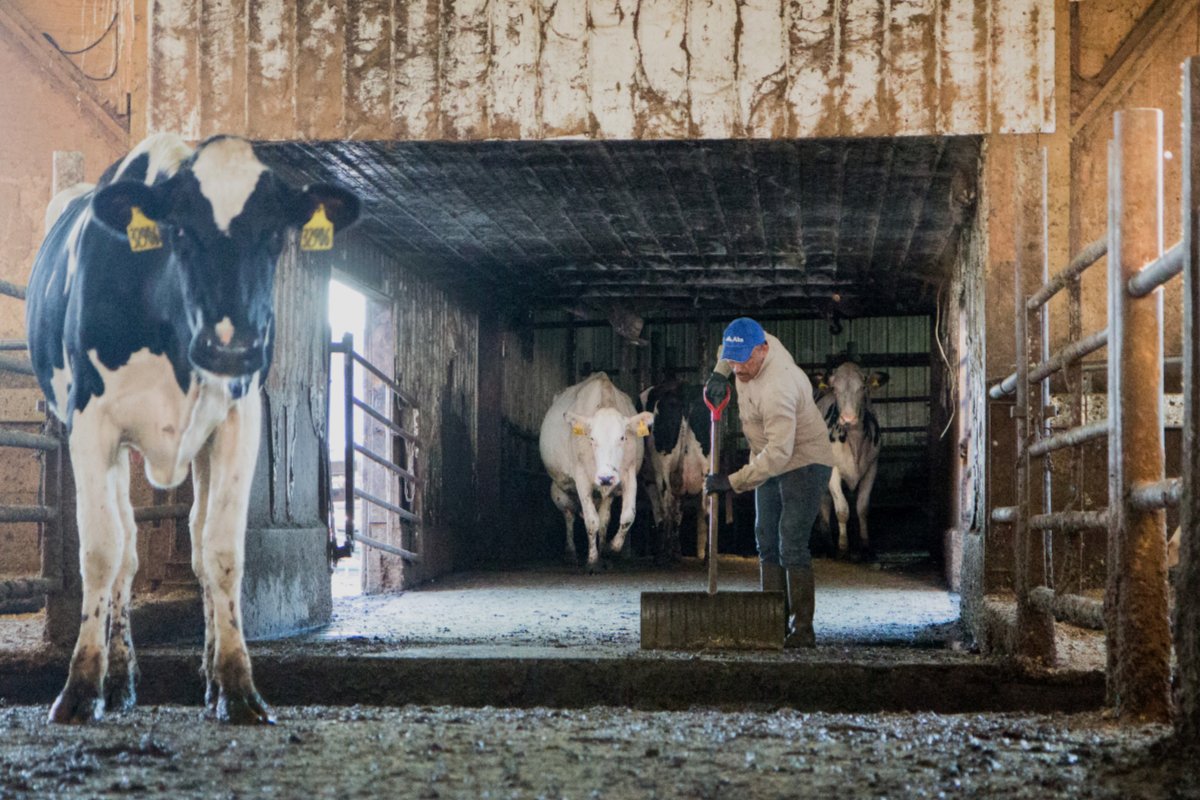Our five-part series takes a deep dive into the risks facing animal ag workers and the corporate behavior that can obscure those harms from public view.

Our five-part series takes a deep dive into the risks facing animal ag workers and the corporate behavior that can obscure those harms from public view.
June 6, 2023

A Milk with Dignity worker in a barn. (Photo credit: Vera Chang)
Civil Eats has won a James Beard Media Award for excellence in investigative reporting for Injured and Invisible, a multi-part investigation by Associate Editor Christina Cooke, freelance reporter Alice Driver, and former Senior Reporter Gosia Wozniacka. Investigations Editor Lee van der Voo led the team and its investigation.
The national awards, considered the Oscars of the food world and established more than 30 years ago, honor the country’s top authors and journalists. Injured and Invisible explores how the advent of increasingly automated and crowded feeding operations for hogs, poultry, cattle, and dairy cows might be affecting the safety of animal agriculture workers.
During the 11-month investigation, Civil Eats reporters discovered that a budget rider exempted the vast majority—96 percent—of the animal agriculture operations that hire workers in the United States from oversight by the Occupational Safety and Health Administration (OSHA). Because of this, 85 percent of deaths related to animal-agriculture were not reported to the federal agency or investigated over a recent decade.
While the U.S. Bureau of Labor Statistics (BLS) shows more than 1,000 deaths related to animal agriculture during this time, OSHA recorded just 149 deaths, with penalties varying from substantial fines to no penalty at all, even in cases where multiple workers died in a single incident.
As reporting about the rider began to anchor the series, writers explored how these increasingly industrial environments affected worker health day to day, and whether corporate actors and the government might be accountable for the devolution of worker safety. These questions led to the development of additional context, including about worker respiratory illness and how some states and worker-driven programs are filling the void to protect farmworkers.
“As a small nonprofit newsroom dedicated to food justice reporting, we are extremely grateful to the James Beard Foundation judges for recognizing the importance of these underreported stories of the lives of the people who work to feed us,” said Civil Eats Founder and Editor-in-Chief Naomi Starkman. “We hope this award will bring greater awareness to their plight and increased attention to these issues.”
The investigation included five stories, but only individual stories or three related pieces could be considered. Contributor Kari Lydersen, who wrote one of the stories not included in this entry, exploring how government incentives for on-farm biogas projects are fueling more crowded dairy and hog operations, was crucial to the overall reporting of this series.
Earlier this year, Christina Cooke’s lead story in the series was named an Aspen Institute Best Idea of the Day and received an Occupational and Environmental Medicine Media Excellence Award. Alice Driver’s story about Tyson Foods also received an honorable mention for the Donald Robinson Memorial Award for Investigative Journalism from the American Society of Journalists and Authors.
In addition, last fall, Cooke moderated a panel presentation of this series at the Oxford Real Farming Conference’s Agroecology & Food Sovereignty Global Gathering, and appeared on the Heritage Radio Network program What Doesn’t Kill You to discuss the plight of workers who have been long left out of the OSHA safety regulations in force for every other industry.
Read the series:
Animal Agriculture Is Dangerous Work. The People Who Do It Have Few Protections.
Federal OSHA protections don’t apply to 96 percent of the animal agriculture operations that hire workers in America. When people die on the job, the federal agency doesn’t respond 85 percent of the time.
‘I Was Coughing So Hard I Would Throw Up’
Workers at the tens of thousands of hog, chicken, and cow CAFOs in the US face severe respiratory health burdens. The corporate response is risk management.
Biogas Expansion May Compound Worker Risks
Government incentives are driving larger, more crowded CAFOs—while protections for the workers inside lag behind.
Tyson Says Its Nurses Help Workers. Critics Charge They Stymie OSHA.
The company’s on-site care system is emblematic of risk-management practices that disadvantage workers farther down the supply chain.
Absent Federal Oversight of Animal Agriculture Safety, States and Others Step Up for Change
States are extending OSHA powers, overtime, and collective bargaining while labor-driven programs center workers.

October 9, 2024
In this week’s Field Report, MAHA lands on Capitol Hill, climate-friendly farm funding, and more.
October 2, 2024

October 2, 2024

October 1, 2024

September 30, 2024

September 25, 2024

September 25, 2024

Like the story?
Join the conversation.